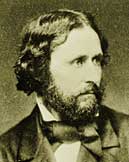Biographies
 John C. Frémont
John C. Frémont Captian John C. Frémont
John C. Frémont, one of the United States’ leading western explorers in the 1830s and 1840s, was born in Savannah, Georgia in 1813. He joined the U.S. Topographical Engineers in 1838 and earned a national reputation for his reports on the American West. In early 1846, Captain Frémont and a small mapping expedition arrived along the border of Mexican California.
Whether by accident or design, Frémont soon plunged into local political intrigue. After several dustups with locals, Frémont encountered a force of Anglo immigrants and disgruntled Californios who advocated a Texas style insurgency to force California into American hands. These agitators declared California as the Bear Flag Republic in June 1846 and Frémont declared himself the U.S. commander in California and led the insurgents and his regulars in a campaign to neutralize all Mexican resistance. The arrival of U.S. Commodore John D. Sloat and a naval expedition added momentum to the campaign, and, by the end of the summer, all of California had fallen to U.S. forces.
Frémont then declared himself military governor of the conquered province. When Brigadier General Stephen Watts Kearny arrived later in the year, the men feuded and Kearny had Frémont arrested and hauled before a court martial. The sensational trial made an even greater celebrity out of Frémont, but he resigned his commission in the army in protest.
After the U.S-Mexican War, Frémont served as U.S. senator from California and, in 1856, became the first Republican candidate for president of the United States. He served in the Union army during the Civil War, and afterward was territorial governor of Arizona. He died in New York City in 1890, one of the most celebrated personalities of the Nineteenth Century.





